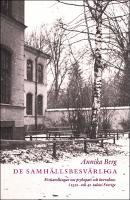De samhällsbesvärliga
Förhandlingar om psykopati och kverulans i 1930- och 40-talens Sverige
Abstract
"In inter-war Sweden, the psychiatric diagnosis of psychopathy served as a controversial but powerful tool for the management of people who failed to live up to contemporary civic ideals. The diagnosis was based on theories of a broad spectrum of biologically-based disorders in the borderland between normality and actual mental illness. The disturbances were assumed to manifest themselves as, for example, homosexuality, hysterical attacks, emotional coldness, mythomania, or restlessness.
Another controversial diagnosis was paranoia querulans or querulous paranoia, a disease that was linked to the emergence of the modern state and its rule of law, and thought to manifest itself mainly in hyperbolic complaints against supposed wrongdoings. Thus, the disorder implicated an excessive use of one's civil rights. A particular dilemma related to this disease was that the kind of behaviour that had usually led to the diagnosis and subsequent psychiatric confinement, namely a ardent manner of writing letters to public authorities, was precisely what was required for discharge.
In De samhällsbesvärliga (The Social Troublemakers), historian of science and ideas Annika Berg examines how patients described as psychopaths or querulants could negotiate for discharge with doctors and authorities in 1930s and 40s Sweden. This was a period in time when the system of psychiatric care in Sweden was greatly expanded in answer to a perceived shortage, but was also transformed into a somewhat more open apparatus with possibilities to apply for preliminary discharge and other forms of outpatient solutions. It was also a time when psychiatry was under attack from different quarters, and psychiatrists were accused of using flexible diagnoses such as psychopathy to confine people wrongly. Against this backdrop, how did the management of psychopaths and querulants fit with contemporary ideals of citizenship and democracy? How did the patients view themselves? And how were negotiations in individual cases affected by notions of, for example, class, gender and sexuality?"
Keywords
Psychiatry; Psychopathy; Paranoia querulans; Diagnoses; confinement; intersectionalityDOI
10.22188/kriterium.15ISBN
9789170617614OCN
1105778297Publisher
KriteriumPublication date and place
Gothenburg, 2019Classification
History
Social and cultural history
Social services and welfare, criminology
Medicolegal issues
History of medicine
Psychiatry


 Download
Download